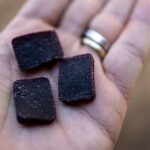Oregon-based Grön Edibles became an international brand this summer, but faces an increasingly competitive local market and a complex latticework of regulation.
Christine Smith founded THC edibles brand Grön (which means “green” in Swedish) as a side project in 2015 while working at an architecture firm in Portland.
She had worked in architecture for more than 15 years. But after one year of operation, she says, she knew she wanted to dedicate herself to Grön full-time.
“I realized I had stopped being creative and I started being a project manager. I was looking for a creative outlet on the side, and I saw this burgeoning cannabis industry,” Smith says. “I saw that there weren’t any really high-quality chocolate products on the line, and so I thought I would make my own.”
Oregon’s cannabis industry has ebbed and flowed since the drug was made legal for recreational use in 2015, but Grön is growing: According to internal reports shared with Oregon Business, the company has grown 276% in overall revenue since 2019.
In August the company officially went international, making a deal with a third-party distributor to sell Grön products in Canada. Smith attributes the company’s growth to its ability to connect to middle-market consumers — and by expanding into a less-regulated, less-competitive national market.
Domestically, Grön products are sold in Oklahoma, Missouri, Nevada and Arizona, as well as Oregon, where most of the products are made. The company has three production facilities in Portland.
Smith says her dream is to open a new Oregon facility if and when cannabis becomes federally legal. But until then, having a single mass-manufacturing plant for edibles doesn’t make sense, given current regulations barring cannabis from crossing state lines. That means all THC-infused products manufactured in Oregon must be sold here.
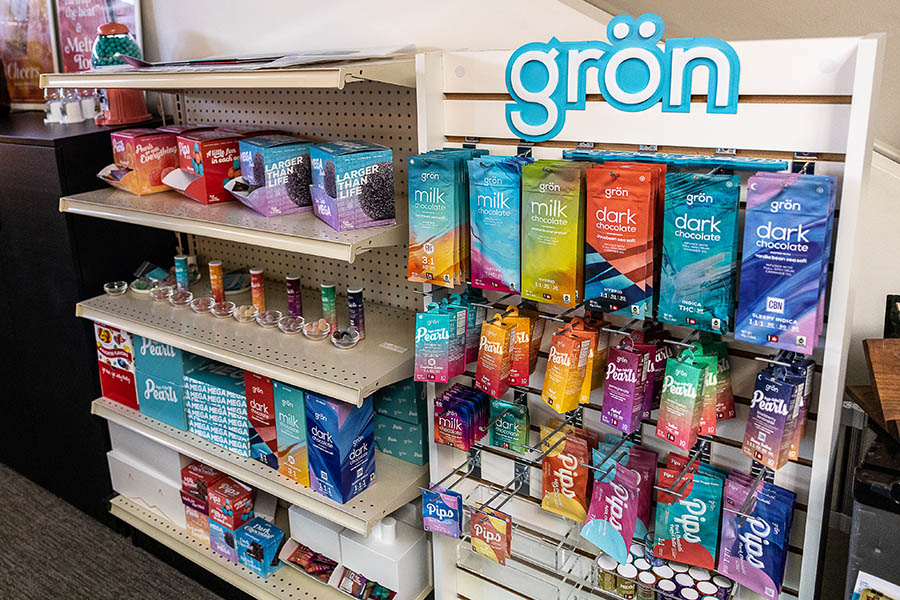 Grön’s colorful packaging. Photos by Jason E. Kaplan
Grön’s colorful packaging. Photos by Jason E. Kaplan
There is nothing illegal about exporting chocolate and packaging, though, from her distribution hub in Portland. Smith can export the packaging, candy ingredients, chocolate and recipes to facilities out of state to be made with cannabis grown in those areas.
Grön operations in Arizona, Oklahoma and Missouri are all run by Grön employees, but the production spaces in those states are sublet to a licensed partner able to obtain a state cannabis- processing license.
The Nevada operation is like the Canada agreement — a true licensing agreement allowing use of Grön’s intellectual property — but allowing for more hands-on involvement in marketing, manufacturing and sales support from Grön. Both are licensing agreements, which operate like franchises, with Grön giving contractual permission to make, promote and sell Grön products in their own markets.
While the exact THC strains present in the candies may not be 100% identical from state to state, she says she has been able to maintain consistency when it comes to the things consumers care most about: flavor, branding and experience.
The metal chocolate dispensers and vats of candy shelling brought to mind Willy Wonka’s chocolate factory, but despite the humming machinery, most of the products were pressed and rolled by hand — something Smith says is a central tenet of good chocolate making. She taught herself how to make chocolate candies by hand while developing her business, and is still the company’s head chocolatier.
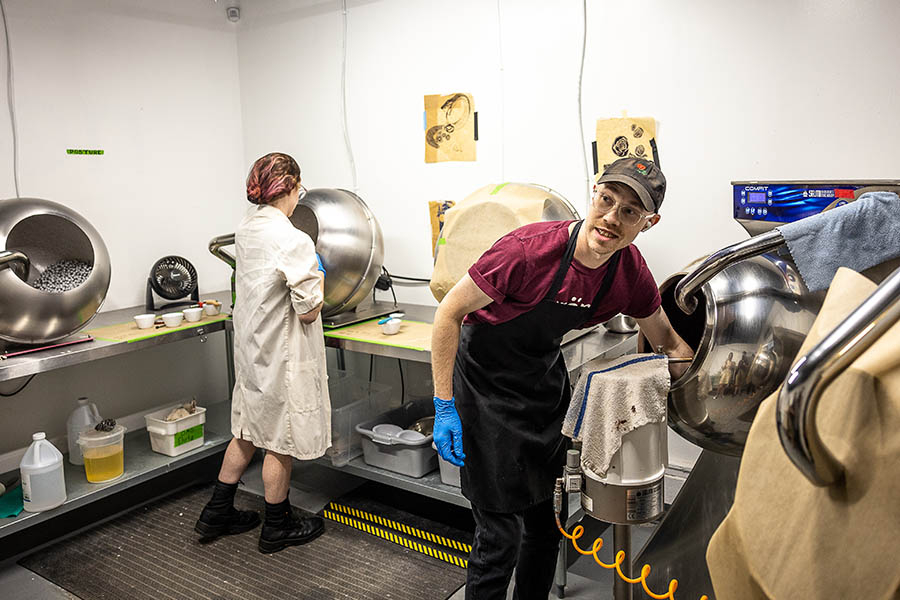 Grön candies in production. Photo by Jason E. Kaplan
Grön candies in production. Photo by Jason E. Kaplan
That is not to say becoming an international brand hasn’t caused problems. Supply-chain issues and the global wheat shortage — an effect of Russia’s invasion of Ukraine in February — have made it challenging to get enough inventory to satisfy demand. (Some of Grön’s candy bars include wheat for sugary wafer crumbles and candy coatings.) Smith tells OB she has had to modify some recipes to leave out rarer ingredients like coconut to ensure consistency while her company grows.
Despite attempts from Democratic lawmakers to legalize cannabis nationally, Smith says that states with budding cannabis markets need federal prohibition to help them compete against out-of-state brands like Grön.
“In my opinion, we’ve crossed a bridge when it comes to national legalization. The companies that have invested in a lot of these states to create the cannabis framework now own those states. Companies have invested billions of dollars to own states like Florida, or Arizona or New Jersey, and those companies have really little interest in bringing the walls down and opening it up for other people to come in,” says Smith. “I think there will be some sort of federal legalization eventually, but there’s going to be a lot of lobbying to keep it state-specific beforehand.”
If Smith is right, it makes sense for states to institute protectionist measures. Oregon’s mature market has less room to grow, but sales of cannabis in the U.S. are still exploding at the national level. According to German market and consumer data platform Statista, sales of flower in the U.S. grew by 27% from 2020 to 2021 and are estimated to grow an additional 29% in 2022. Sales of edibles are lower, less than a quarter of overall flower sales (estimated $3 billion nationally compared to $14.1 billion for 2022), but have also increased 22% and 24% over the last two years, respectively.
The Oregon market is growing more slowly. According to OLCC department data, edibles and tinctures sold $10.5 million worth of product in September of 2022, compared to $41.2 million worth of usable marijuana flower and $20 million of extracts and concentrates.
But sales of edibles appear to be more resistant to price fluctuations. Sales of flower products declined 35% from their high in July of 2020. Edibles declined 14.3% from their record high of $12,279,418 in April of this year.
Grön edibles are still sold mostly in Oregon: About 40% of the company’s revenue comes from the Oregon market. But that percentage is going down every year.
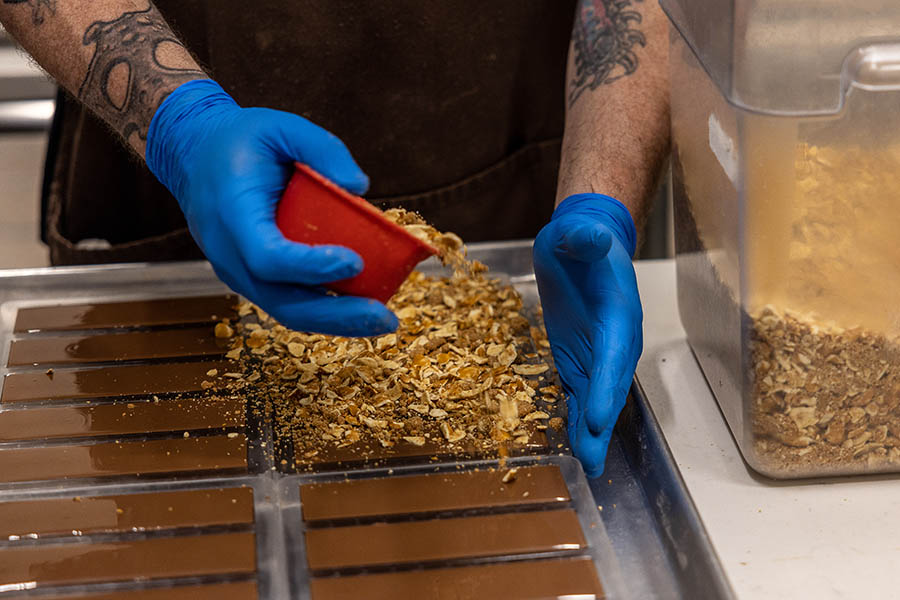 Grön edibles often feature high-quality chocolate. Photo by Jason E. Kaplan
Grön edibles often feature high-quality chocolate. Photo by Jason E. Kaplan
Josh Snyder, co-owner of Smooth Roots dispensary in McMinnville and Lincoln City, says new edibles products — from gummies and brownies to popcorn, soda and frozen desserts — are landing at his stores constantly.
That can make it difficult for brands to keep up. Smooth Roots stopped carrying Grön two years ago when, Snyder says, he wasn’t seeing the product move as quickly as some of the newcomers.
“I think Oregon has more gummies than probably any other state,” Snyder says. “I swear, every other day somebody arrives trying to show me a new edibles product. While the edibles market is highly saturated, it’s also stable and shows the most potential for growth, since edibles are popular for medicinal use and among middle-market consumers.
“You can dose yourself really well now on the legal market,” Snyder says. “You can know you’re taking 2 grams, 5 grams, and with nanotechnology, edibles can be affecting you for 15 to 20 minutes, as opposed to eight hours. We’re seeing more elderly people using cannabis and using it for sleep, including my grandma.”
But Oregon edibles makers could have trouble getting bedtime cannabis products to larger markets. CBN, a cannabis derivative present in many gummies meant to help with sleep, was banned from supermarkets by the OLCC, a ban which took effect on July 1. According to the OLCC, the compound, which produces drowsiness, is frequently created under laboratory conditions and thus considered “artificially derived.”
Christine Smith, whose CBN products were removed from grocery stores in July, says the OLCC’s decision “broke [her] heart.”
Smith says she’s thankful the OLCC is giving edible companies a year to continue selling through dispensaries and is hopeful the commission will revise its ban once more research on the compound has been conducted.
“The one-to-one-to-one THC, CBD and CBN format is so effective. There’s a reason why it’s 30% of our revenue,” says Smith. “To lose that for consumers, I think, was setting back the industry. So being able to find at least an avenue for us to be able to keep it on market in Oregon I think is important.”
After the OLCC’s announcement, both Smith and an attorney for Wyld — another Oregon edibles manufacturer with a multi-state footprint — slammed the ban as hobbling Oregon cannabis brands from growing in their home state.
Because of the grocery-store ban, Grön officially discontinued its line of CBN-only products, since its top-selling item contained CBN. Smith says she has no intention of leaving Oregon, though the ban did make her reconsider where Grön’s world headquarters should be located, especially given her company’s continuing expansion into other states.
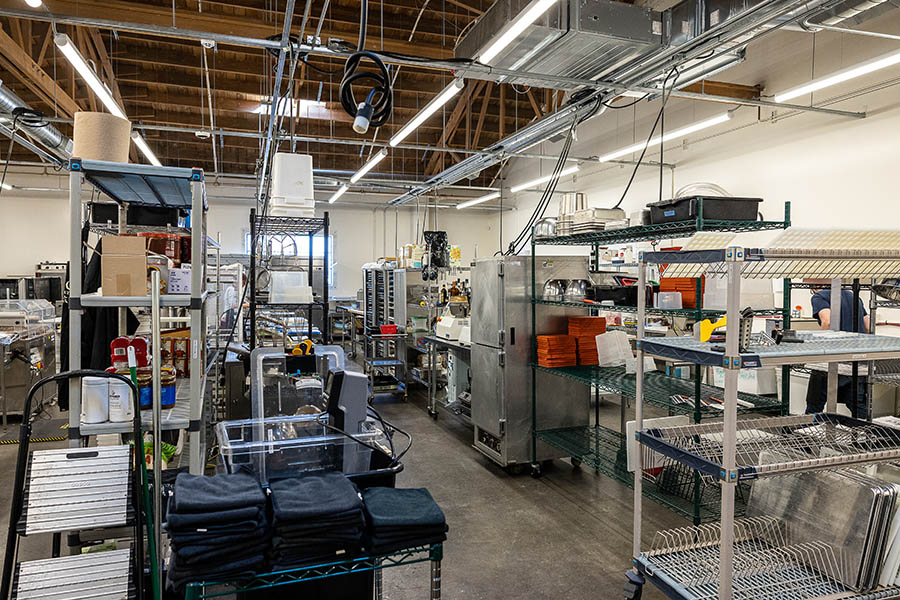 Grön production facility. Photo by Jason E. Kaplan
Grön production facility. Photo by Jason E. Kaplan
She says the biggest industry shock will arrive in July 2023, when all CBN products not meeting FDA approval will be banned from all Oregon markets.
Cannabis products cannot achieve FDA certification because marijuana is federally illegal. But the agency can designate products as Generally Recognized as Safe, a notification companies must apply for at their own expense.
Smith says Grön’s current CBN supplier, Milwaukie-based cannabinoid biotechnology firm FloraWorks, will likely be the only CBN supplier able to meet OLCC requirements. A representative from Wyld told OB via email that company leaders are confident their CBN supplier will both meet the deadline and “definitively prove the safety profile of CBN as an edible ingredient.”
“The OLCC says your CBN products need to be FDA approved, but you can’t be FDA approved. The FDA isn’t approving cannabinoids, so what they allowed for was an independent review process where they accept the approval of a third party. FloraWorks is spending somewhere maybe in the million-dollars [range] to do a third-party toxicology study to show that this is not dangerous,” says Smith. She notes CBN products have not been shown to be dangerous for consumption by any research she is aware of, with millions of CBN products being on the market.
Smith believes the Oregon cannabis market is overregulated but says companies that can compete with Oregon’s cannabis standards are in better shape across the country. Until federal legalization takes place, and likely after, states will have differing standards on what they consider acceptable THC products — standards which Grön will have likely met or exceeded in Oregon.
Despite Oregon’s comparatively heavy regulations, Smith says having a strong presence in Oregon will always be a top priority for her company. She describes Oregon cannabis consumers as having refined taste, and that staying ahead in the hypercompetitive Oregon market gives Grön the best chance to succeed elsewhere.
“It really still is the Wild West out there. We’re trying to stay ahead of regulation because, I mean, our livelihood is at stake, and the industry is moving so fast and evolving that the rules are trying to keep up,” says Smith.
“As a cannabis brand, if you can make it here, you can make it anywhere,” she says.








